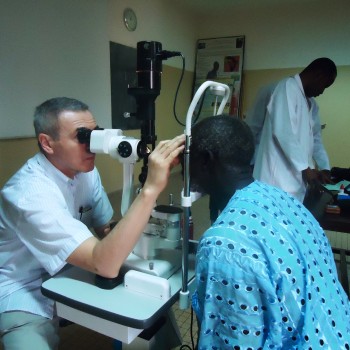Dr. Bacin has just returned from Mali. At his 67 years of age, this is the third time that he has been in the Tropical Africa Ophthalmological Institute (IOTA) within the framework of the training activities that the Foundation has been running since 2008 and which are part of the eye health improvement project in Mali.
This formative commission had to be postponed after the military uprising in the country and the armed conflict that conditioned the development of the project, but, despite everything, Eyes of the world and Dr. Bacin continue betting on the subspecialization in the retina of the ophthalmologists and residents of IOTA.
Why do you collaborate in the training activities carried out by Eyes of the world?
I collaborate with Eyes of the world because it is a committed, efficient and generous organization. It has an open spirit that includes the collaboration of French personnel.
In what situation is ophthalmology, and more specifically, the retina subspecialty in Mali?
I can only talk about what I’ve seen in the IOTA. Since 2010, I have been able to see a constant improvement in the care of retinal diseases, regarding diagnosis as well as medical and surgical treatment. The IOTA has a good operating room, and it even has possibilities that are not yet used due to lack of practical training.
There are more often local cases successfully treated, without the need for costly and complicated sanitary evacuations of patients. At this rate, prospects for the treatment of these diseases that lead to blindness, seem very favorable.
To what extent is Eyes of the world contributing to the progress of the fight against retinal pathologies in Mali?
Eyes of the world, in my opinion, has contributed in a very remarkable way to the evolution of retinology in Mali. Thanks to the Foundation, online training sessions have been given by videoconference between the University Hospital Center of Clermont-Férrand in France and the IOTA of Bamako. Eyes of the world has also funded commissions of theoretical and practical training aimed at colleagues in Mali and carried out by French specialists. It has also financed a retina training in Spain and Italy by Dr. Guindo.
In 2013, Eyes of the world made a very generous new donation of equipment and material to IOTA. This donation constitutes a decisive and remarkable step in the attention of pathologies of the retina, not only in Mali but also, without a doubt, in most of the neighboring African countries.
How do you value your experience as a teacher in Bamako?
For me, the IOTA is the space where I carry out most effectively my vocation as a teacher. This institute is a training place for many ophthalmologists from West Africa and North Africa.
My classes are always listened to with attention and followed by many questions. In each commission, I meet the team members and the students, and I can appreciate their progress and guide them towards their autonomy.
How do you see the country now? What do you think is its future?
I wish, very sincerely, that Mali welcomes peace and religious tolerance again. Mali is a wonderful country in development. Peace and tolerance should allow offering their citizens the best progress and happiness possible.
